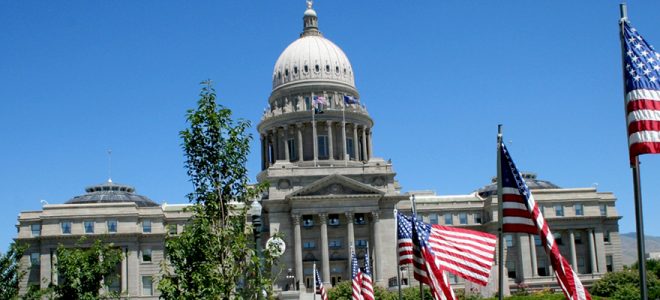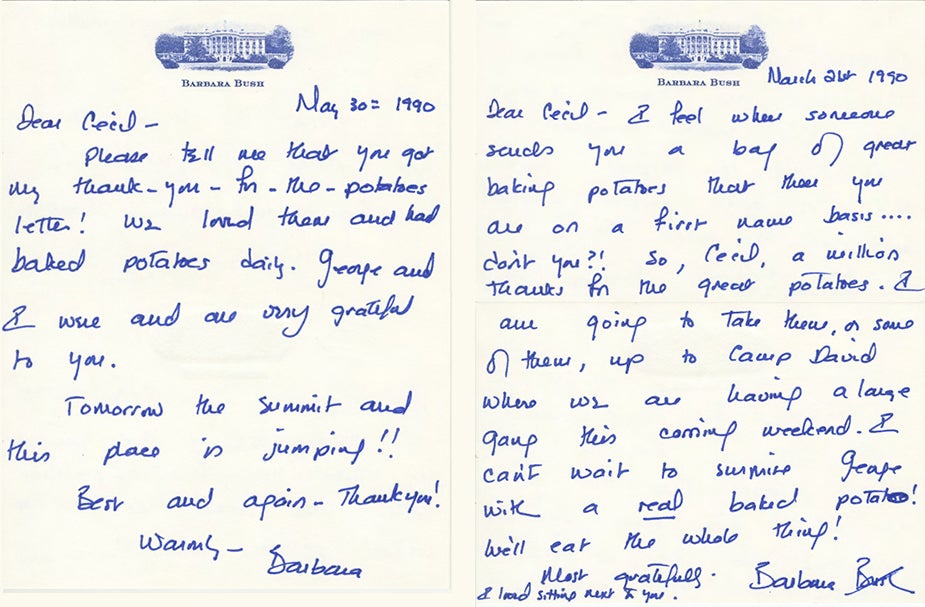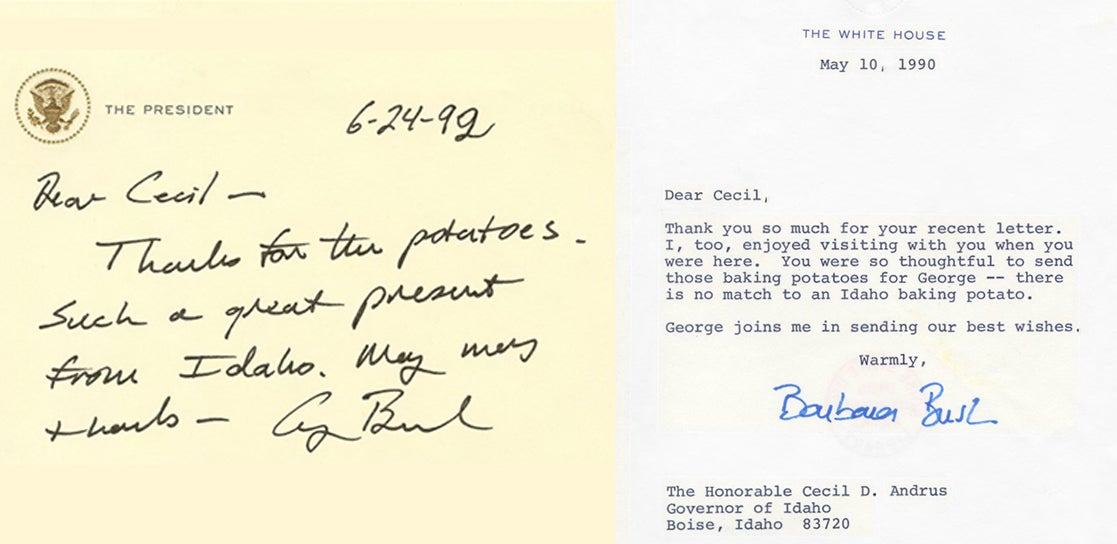

Barbara Bush, who died recently at 92, was the wife of one president and mother of second president and she has been remembered as a champion of literacy, a fierce defender of her very political family, and as an opinionated participant in the public arena whose occasionally salty candor raised eyebrows. It is less well known that she – and husband George H.W. Bush, the 41st president – loved an Idaho baked potato.
That love of a good baked potato led to an unlikely political – and personal – relationship.
In 1990 I was press secretary of Idaho Governor Cecil D. Andrus, a Democrat then in his third term, and not a particular political fan of the Bush clan. Andrus endorsed and campaigned for Bush’s opponent, then-Massachusetts Governor Michael Dukakis in 1988. But Andrus, who could be a tough partisan, also had a genuine reverence for the office of president. He frequently said he accepted President Jimmy Carter’s offer to serve as Secretary of the Interior out of a sense of duty and because “when the president asks you to do something you try to do it.”
Cece Andrus’ encounter with Barbara Bush occurred during one of the Washington, D.C. rituals that even in the most partisan environment can still infuse our politics with an important degree of civility and good manners. By all accounts the Bushes were masters of the social graces of politics and when they hosted the nation’s governors for a black tie dinner at the White House during the annual winter meeting of the governor’s association it turned out that Cece Andrus was seated next to Mrs. Bush. (It is tradition at White House dinners to seat spouses separately in the State Dining Room and then-First Lady Carol Andrus was seated at a different table nearby.)
The outgoing Mrs. Bush and the outgoing Idaho governor immediately fell into dinnertime conversation and before long the First Lady mentioned that she was having a devil of time securing really good potatoes, potatoes like the famous Idaho-grown Russet Burbank, for use in the White House. Mrs. Bush made it clear her husband loved his baked potatoes.
When Andrus later related his conversation with Mrs. Bush I could only imagine that he launched into his well-honed pitch for Idaho’s finest. On two separate occasions during his time as governor Andrus starred in television commercials promoting Idaho spuds and he had the sales pitch down cold. He knew all about the ideal growing conditions for potatoes in Idaho, the warm days and cool nights, the volcanic soil. “There is nothing like an Idaho potato,” Andrus would have said to Barbara Bush.
Before the governor left the White House that evening he had the name and phone number of the White House staffer who handled the Executive Mansion grocery shopping and when he returned to Idaho he contacted the Idaho Potato Commission and had a shipment of Idaho’s best bakers sent directly to Barbara Bush.
My memory is that Andrus dispatched at least two potato shipments, which the Bushes acknowledged in three separate notes between March and June 1990.

In a handwritten note dated March 21, 1990– bright blue ink on her personal White House note card – Mrs. Bush said: “Dear Cecil. I feel when someone sends you a bag of great baking potatoes that you are on a first name basis … don’t you? So Cecil, a million thanks for the great potatoes.” Mrs. Bush went on to say that they “were headed for Camp David” and she planned to surprise the president with “a real baked potato” and that George “would eat the whole thing.” She scribbled at the bottom of the card, “I loved sitting next to you.”
A follow up thank you note from Mrs. Bush – she wrote to Andrus on the eve of the historic June 1, 1990 summit between her husband and then-Soviet leader Mikhail Gorbachev – noted that “this place” – the White House – “is jumping” with preparations for the foreign visitor. Again the First Lady expressed thanks for the small gesture of sending the Idaho potatoes.
A final White House potato missive came to Andrus in late June 1990, when President Bush himself sent a handwritten note of thanks for “a great present from Idaho.” Bush, well known for his warm personal notes, must have had other more important things on his mind when he wrote that June 24 card. Two days later he made a fateful political decision that came to define his presidency when he reneged on his 1988 campaign pledge of “no new taxes” and called for a tax increase to control the federal deficit.
Andrus often said that “politics is a game of addition,” of constantly working to attract supporters and build good will and that you can practice “addition” while still honoring your principles and by demonstrating civility and common courtesy. Andrus didn’t have to send those potatoes to the Republican in the White House, but he did. President Bush didn’t need to write his scribbled thank you note to a Democratic governor, but he did. Mrs. Bush could have acknowledged a kind gesture with a form letter, but she didn’t.
These are little things on the broad canvas of big issues, but they also demonstrate a degree of basic human politeness, a measure of civility that must be part politics. Barbara Bush will be remembered for many things, but she should be remembered in Idaho for loving a good baked potato, for skillfully procuring some bakers for her husband and for charming an Idaho governor into being her supplier.
